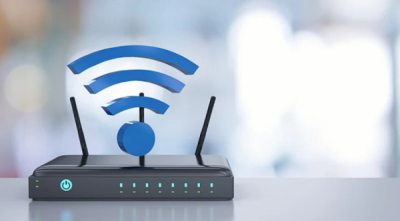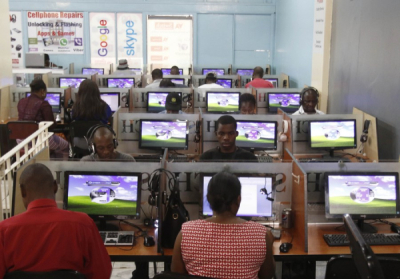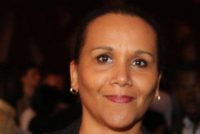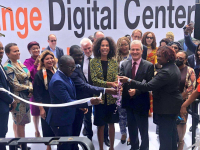
Telecom (150)
The initiative is in line with the Ivorian government's plan to make the country an energy hub by building an energy mix constituted of at least 42% renewable energy by 2030.
Telecom operator Orange and engineering group Butec announced, Tuesday (Jan 17), the solarization of Groupement Orange Services (GOS), an IT services company based in Côte d'Ivoire.
According to a release published by the telecom company, by solarizing the GOS, Orange will reduce its data center's carbon footprint in Côte d'Ivoire, decrease the share of non-renewable energy and avoid using generators powered by fuel since fossil energy emits carbon dioxide.
For Brelotte Ba, deputy managing director of Orange Middle East and Africa, the energy generated by the solar plant connected to GOS and the energy supplied by electric utility Compagnie Ivoirienne d’Electricité will increase the percentage of renewable energy in the energy used by GOS to 48%, in line with Orange's goals. "We plan to go further by solarizing the Yamoussoukro-based Assabou data center. The solar plant connected will cover more than 46% of the data center's energy consumption in the daytime," she added.
The solar plant connected to GOS comprises 781 latest-generation photovoltaic solar modules and provides the data center with an estimated 527MWh/year of renewable energy. It is designed to operate 7 days a week in self-consumption mode, i.e. by using the solar energy produced by the data center during the day, which currently covers 50% of the data center's daytime consumption (7 am-6 pm).
According to Armand Seya, Butec Energies & Services' regional director in West Africa, the project is of paramount importance both for Orange Group and for Butec" since it is in line with its ambitions to develop the energy services business in Africa, specifically in renewable energies."
Samira Njoya
With the support of telecom operator Orange, Morocco, which plans to become a major tech hub in Africa, will benefit from modern networks and socioeconomic opportunities that are expected to reinforce its regional position.
Orange Morocco recently signed a deal with Medusa Submarine Cable System for the construction of a subsea cable that will enhance digital interconnection between Morocco and Europe.
In a release dated January 16, 2023, Hendrik Kasteel (photo, right), CEO of Orange Morocco, explains that the interconnection will reinforce Morocco's position as a digital gateway to Africa while confirming the country's digital sovereignty.
"Thanks to the project, Orange Morocco will contribute to the construction of the first subsea cable to interconnect the main Mediterranean countries, in partnership with Medusa. Specifically, the system will connect the two shores with 16 landing points in countries like Morocco. Under its open innovation policy, Orange Morocco will share the new infrastructure with operators that wish to use it," the release informs.
The cable system will also include segments that will offer up to 24 fiber pairs and a capacity of 20 Tbps per fiber pair. The 8,760 kilometers long cable will be the first and longest submarine cable to connect five Mediterranean countries (Cyprus, Spain, France, Italy, and Portugal) to four countries in the European Union's southern neighborhood (Morocco, Algeria, Tunisia, and Egypt) at a total cost of €342 million. The system will be partially operational in Europe by the end of 2024, and in the Eastern Mediterranean region during the first half of 2025.
Orange Morocco also plans to integrate the first African fiber optic backbone, Djoliba, which is the result of the interconnection of more than 20,000 km of Orange Group's terrestrial and subsea infrastructure in West Africa, for a secure end-to-end link between eight countries in the region.
Samira Njoya
Charles Kouame is the senior manager in charge of the deployment of telecom group Orange's Djoliba, a fiber-optic network that will interconnect West African countries and even more countries outside the region. With We Are Tech, he discusses the advancement of the project and its prospects.
In 2020, Orange announced Djoliba, its fiber optic network that will connect West African countries. What is the status of the project?
We have already connected six countries namely Côte d'Ivoire, Senegal, Burkina Faso, Mali, Ghana, and Nigeria. Connection is ongoing in two countries; Liberia and Guinea. We aim to build a network infrastructure that will interconnect most West African countries like the Djoliba river which irrigates a large part of the sub-region. The project was initiated because of the growing demand for broadband connections in Africa.
When Djoliba was launched in 2020, Orange invested a little over EUR 8 million. In 2022, the network, which was already congested of being greatly overrun was upgraded. To improve its capabilities, Orange made an additional investment in the Djoliba project.
Djoliba greatly contributes to the development of connectivity in Mali, Burkina Faso, and Guinea-Bissau. The infrastructure enabled many firms, notably banks operating in the sub-region, to easily interconnect with their headquarters based in Dakar or Abidjan.
The system's capacity is infinite. It can be increased by adding the appropriate equipment. To date, its equipped capacity is 300 gigabytes. The initial capacity was 100 gigabytes but an additional 200 gigabytes have been added this year.
Why was such a large project initiated just for the West African region?
West Africa hosts the largest number of Orange subsidiaries. It was thus selected to host phase 1 which targets eight countries. The second phase will target Central African countries like Cameroon and the Democratic Republic of Congo. The project will also target countries like Morroco, Niger, Mauritania, Togo, Benin, and Sierra Leone. Later, around 2025, we will even consider expanding the network to South Africa, Botswana, and Kenya. The aim is to connect the major capital cities where there is greater internet traffic even in countries where Orange is not present. With Orange group's point of presence on every continent, the Djoliba network, which is interconnected with those points of presence, gives our clients round-the-world reach.
Specifically, what will this infrastructure be used for?
Orange aims to popularize broadband connection by making major investments, which will help offer quality but most affordable internet. In under a year, for instance, Djoliba allowed the Malian subsidiary to make unlimited offers. Djoliba also helps meet the needs of subscribed operators, internet service providers, and firms.
We all noticed that the coronavirus pandemic caused a surge in telecommuting. Some of our lifestyle habits have virtually changed. To improve their operational efficiency, businesses need some online tools and quality broadband is required to access those tools.
Companies in the banking, mining, and telecom industries among others have bought Djoliba's fiber capacities to improve their collaboration with their headquarters and their access to information technologies. Djoliba is also useful for mobile operators. The pan-African network was launched to improve digital inclusion in Africa.
With the advent of Djoliba, affordable broadband connectivity has supported the development of content creation in several countries. Influencers can now give more visibility to their activities. The fiber optic network is also a great opportunity for online services because, with poor or inaccessible internet, their clients cannot buy their online services.
Is Djoliba different from similar projects like 2Africa, where Orange is also committed?
Djoliba is a network built from terrestrial and submarine fiber optic cables. When commissioned, 2Africa will be integrated into Djoliba. Djoliba's current submarine routes include the Africa Coast to Europe (ACE), South Africa Transit 3 (SAT3), or the West Africa Cable System (WACS). We have terrestrial routes secured by submarine routes. We are waiting for the arrival of the 2Africa cable to integrate it into the network and offer our customers a resilient network system. Djoliba will also help offer a secured terrestrial extension to the capacities of the 2Africa cable.
The World Bank estimates that hundreds of millions of Africans still live more than 50 km away from a fiber optic network. How does Orange intend to improve access (offer and cost) for populations with a growing need for very high-speed broadband?
Through its subsidiaries, Orange heavily invests in the development of fiber optic networks in its markets. Some of those markets, like Mali, Burkina Faso, and Guinea, are virtually virgin territories. Therefore, the investments made by Orange are huge. In the major cities of those markets, Orange is investing heavily to fulfill the strong commitment made by Orange Middle East and Africa. The aim is to bring fiber optics closer to populations and households. The various Orange Middle East and Africa subsidiaries are deploying their fiber optic infrastructure and Djoliba will allow them access to more internet capacities thanks to its network of subsea cables whose international traffic it carries. When 2Africa lands in Dakar and Abidjan, Burkina Faso and Mali will access its capacities through Djoliba, which is a secured transport system.
What is Orange's plan to meet the growing broadband connectivity demand in rural areas?
Orange wants to popularize broadband in the Middle East and Africa. It is therefore making huge investments in domestic pan-African and subsea fiber optic networks. Despite the investments made, some rural areas still have no access to broadband. To meet the demand in those areas, our state can also deploy fiber optic networks in remote areas through universal service funds.
With demand for broadband connectivity accelerating across Africa, South African authorities want to provide more capacity to enable Internet service providers to meet the needs.
In the recently published draft amendment to the current radio frequency regulations, South Africa’s ICASA proposed additional radio spectrum for the provision of high-speed wireless internet.
ICASA explains that its decision to update the regulations is justified "by the need to keep the provisions of the regulations current with the existing and emerging technologies aimed at revolutionizing the electronic communications sector." It, therefore, proposes the allocation of the lower part of the 6 GHz band (5925 MHz to 6425 MHz), as well as the 122 GHz to 246 GHz band for non-specific short-range applications.
The ICASA's decision follows pressure from South Africa's Internet service providers in recent months to free up more spectrum in the 6 GHz band. According to the Wireless Access Providers Association (WAPA), this band is expected to enable the deployment of Wi-Fi 6E, the latest Wi-Fi technology, fetching up to US$57.76 billion to the rainbow nation over the next ten years.
According to ICASA, the release of additional spectrum in the 6 GHz band "will provide a much-needed boost for Wi-Fi availability and uptake, and is expected to enable faster data communications between devices connected to wireless infrastructure, reduce latency, and improve efficiency and data throughput."
Isaac K. Kassouwi
Zimbabwe's economy is largely dependent on the exploitation of natural resources. With the fourth industrial revolution underway, Harare wants to make digital technologies the foundation of the country's development by 2030.
Zimbabwe approved, Tuesday (Dec.20), the national 2023-2030 broadband program. The program aims to accelerate broadband penetration in the country and reduce the cost of access to 2% of the average monthly income per capita from the current 10.1%.
The program plans several key projects that will be funded by the government and private investors. In addition, a broadband committee will be established to provide a periodic assessment of progress, facilitate coordination and collaboration, and make suggestions for adjustment.
The broadband program is part of the Emmerson Mnangagwa government's strategic vision to make Zimbabwe a high-income economy by 2030. The government wants to drive access and adoption of broadband services across government agencies, businesses, households, and individuals to transform Zimbabwe's growth trajectory from one driven largely by natural resource exploitation to one driven by innovation.
For Minister of Information Monica Mutsvangwa, “the importance of broadband and its transformative benefits include the following: enhancement of global competitiveness, job creation, increased productivity, improved national security, and enhancement of performance in education, agriculture, health, and governance. [...] All of these are prerequisites for achieving the Sustainable Development Goals.”
Isaac K. Kassouwi
On the sidelines of the 2022 Climate Change Conference (Cop27), Jean Michel Canto, Orange Middle East & Africa's Director of Sustainable Energy & Partnerships, gave an exclusive interview to We Are Tech. During the interview, he highlighted the French group’s climate commitment in Africa.
We Are Tech: Why is Orange taking part in the Cop27?
Jean Michel Canto: Several years ago, Orange made clear environmental and climate commitments. For a long time, we are committed to these issues, which are very important to us. We have already taken several actions in our markets to reduce our environmental impact. Through the Cop27, we want to support governments in reaching their ecological and energy transition goals. We want to work with governments to develop renewable energy, to develop ecosystems, and circular economies. At the Cop27, Orange Group, through the Director of the Environment, is reiterating its environmental commitments and its availability to support governments in their projects to their reduce carbon footprint. We are ready to work daily with countries to collectively achieve these commitments.
WAT: You keep mentioning support to countries. What does such support concretely entail?
JMC: One of the major challenges in achieving our environmental objectives and for countries to achieve theirs is access to renewable energy. The second axis is the whole ecosystem of the circular economy.
Presently, it's true that regulations don't allow us to do exactly what we would like to do, notably build and develop solar farms and directly use this renewable energy. But by working hand in hand with countries, we are confident that we will be able to change these regulations and attract the necessary investments in African countries to multiply the deployment of solar and wind farms wherever possible.
The circular economy is the recycling of telephones and telecom equipment that we use every day. For renewable energy, as an operator and private industry, we can attract the capital needed to develop renewable energy in Africa. In Africa, no factories are specializing in refurbishing telecom equipment and phones for new use. Our ambition is to work with governments so that such factories can be set up in Africa.
For the time being, telecom equipment and phones are sent to Asia and Europe to be refurbished. We are sure that the development of this type of activity on African soil will create jobs but will also contribute to the development of the circular economy and reduce raw material extraction, which is harmful to our planet.
WAT: Phones become electronic waste when they are no longer useful. This is obvious but how does Orange’s infrastructure harm the environment?
JMC: Like every activity, industry, and company, we need electricity. So do the infrastructure through which we provide services to our subscribers. Using non-renewable energies such as diesel to guarantee the continuity of our services in certain areas with poor access to electricity accentuates the impact of our infrastructure on the environment. Put simply, it is through carbon emission. Renewable energy greatly reduces this carbon footprint. We are already working with our infrastructure and equipment suppliers to ensure that they have a strong commitment to limiting their impact on the environment right from the design stage.
Objectively, in Africa, the major factor contributing to our carbon emissions is the use of energy to power all our telecom towers, data centers, etc. This is why we are insisting on the use of renewable energy sources. That's why we put a lot of emphasis on working with countries or governments to develop renewable energy. A few years ago, we were using so many generators to power our telecom towers. But we are gradually deploying solar panels, which generate clean energy, to replace them.
Digital technologies are great tools. They enable videoconference and teleworking but telecom infrastructures are mostly needed for all that. With eco-responsible telecom infrastructures and equipment, we can greatly limit the impact we could have on the environment and the climate.
WAT: Orange has developed a program called "Net Zero Carbon 2040". What is it about?
JMC: Net Zero Carbon 2040 is Orange's strong commitment to the climate. It means that we are committed to strongly reducing our carbon emissions through the use of renewable energy. We are aware that there will still be an incompressible minor part of our carbon emissions. Not every activity can be fully clean. To compensate for these residual carbon emissions, we must commit ourselves to solutions that are called carbon sinks, i.e. solutions that will capture the CO2 that we will emit.
We have already launched major carbon sink projects in countries like Senegal, Cameroon, and Madagascar. We have made commitments to plant trees and protect the mangrove ecosystem. We have signed a partnership with experts in the field. Orange is specialized in the telecommunication industry. So, we rely on environmental experts for climate-related issues, including the protection and development of the mangrove, which is a great carbon sequester. We are committed to taking such actions in Africa and we believe that thanks to them, we can meet our net zero carbon goal by 2040.
We have a milestone for 2025. This milestone is that by that time, more than half of the energy used by the group must be generated by renewable sources. This is a big challenge. That's why we continue to power our sites with solar panels and do the same for our data centers, which are energy-intensive.
In Africa, we have more than 6,000 telecom sites equipped with solar panels. We will continue and accelerate this energy transition to the rest of our equipment. In countries such as Guinea, Sierra Leone, Madagascar, and Jordan, more than half of the energy consumed by the network comes from renewable energy sources that we produce ourselves. If possible, we would like to develop solar and wind farms, to inject this clean electricity into the electricity grid of the countries in which we operate and use this clean electricity on all our telecom towers. In addition to that, we have commitments to reduce our carbon footprint on what we call SCOPE 1 and 2, fuel and electricity namely. Orange as a group plans to reduce the use of such energy sources by 30%.
WAT: Orange works with telecom tower managers. How does the group reconcile this operational cost management with its environmental commitments?
JMC: We work with tower managers (towercos) in five countries. In the twelve other markets, we operate our own towers. When we operate our own towers, we call on experts to help us with this transition. We call these experts ESCOs. These energy experts from the telecom industry help us to modernize our energy production chains in our telecom towers, adding as much solar energy as possible, and adopting the right size for our current and future needs. In Africa, all three tower managers we work with have renewable energy commitments for 2030, 2040, and 2050.
WAT: In addition to reducing the environmental impact of its business activities and carrying out direct actions in favor of the climate, such as carbon sinks, how does Orange's investment in the environment integrate the well-being of the African population?
JMC: The impact on society is as important as the impact on the environment. Through all the direct climate activities, such as the protection of the mangrove, which meets our environmental objective, Orange also aims to develop the entire ecosystem around it to benefit populations. Training will therefore be organized and new jobs created as we know that the mangrove produces wood and by-products can therefore be produced and sold. We have included support in this very important project. We also are deploying Orange Digital Centers (ODC) everywhere in Africa. Through those infrastructures, we will raise awareness of environmental issues by organizing activities like coding competitions focusing on the environment for young people. Africans are awaiting those environmental projects because they will be the first parties affected by climate change. With the drought in some regions, fishing villages disappearing in Senegal, etc, those populations are beginning to feel the impacts of climate change.
WAT: Can we consider Orange Energie as one of the components of Orange's environmental action?
JMC: Yes, it is. Orange Energie allows access to solar kits, which are symbolic since by definition solar kits provide renewable energy for schools, professionals, etc. It is not limited to solar kit distribution, however. It also projects to build mini-grids, namely small solar farms that can supply one or two villages with no access to energy.
Once again, these are, by definition, renewable energies since they are solar fields that will be deployed. These are two examples that bring essential services to the populations, in addition to responding to strong environmental issues.
The environmental issue is a broad subject and Orange is fully committed because it is important for us and the development of the African continent.
Interview by Muriel Edjo
In Africa, telecom operators used to shun rural areas, which were deemed not attractive enough. However, with the acceleration of digital transformation, most of them are operating strategic repositioning.
Last Tuesday, Orange -through Orange Côte d'Ivoire- announced a service agreement with tech innovation company Vanu Inc to extend its network coverage in Côte d'Ivoire, Burkina Faso and Liberia. The agreement includes the provision of technology upgrades and will be based on the innovative "Network-as-a-Service" (NaaS) model. It will begin with the rollout of 1,070 sites, including 700 in Côte d'Ivoire, 170 in Burkina Faso and 200 in Liberia.
According to Nafy Coulibaly (photo), Orange's deputy general manager in charge of operations in Côte d'Ivoire, Burkina Faso and Liberia, "Orange will roll out its services by strategically improving/increasing its network coverage so that no one is left behind.”
“Our goal is to provide free and open access to digital services, anywhere and to as many people as possible [...] to make digital services accessible to millions of people in rural areas of Côte d'Ivoire, Burkina Faso and Liberia who were not covered before,” she added.
The partnership between Orange Côte d'Ivoire and Vanu, Inc. is part of Orange's IDEAL program, which aims to extend network coverage in rural areas to 20 million people through the construction of 5,000 sites over four years. Rural areas in Africa, where a large proportion of the population still resides, are poorly covered by telecom networks. Yet, they have high-growth potential.
By strengthening its presence in rural areas, Orange Group is moving to increase its subscriber base, facilitate access to digital services and ultimately become the main operator in the targeted markets.
Muriel Edjo
Five years after losing its first satellite, Angola announces the coming launch of Angosat-2, its second satellite delivered last July 26.
Angola will launch its second satellite, Angosat-2, built by Russia next Wednesday, October 12. The planned launch was announced, on October 4, by Mário Augusto da Silva Oliveira, the Angolan Minister of Telecommunications, Information Technology, and Social Communication (MINTTICS).
The satellite will be launched from the Baikonur Cosmodrome in Kazakhstan, through the Russian Federal Space Agency (Roscosmos). It is the result of the complementary protocol to the contract signed by Russia and Angola, providing for the construction of a replacement satellite in case of failure of the first Angosat-1 satellite, worth US$327.6 million.
According to the director general of Angola's National Space Program Management Office (GGPEN), Zolana João, Angosat-2 will be seven times faster than its predecessor Angosat-1, which was lost hours after its launch in 2017.
With a high data rate (HTS), providing 13 gigabytes in each illuminated region (satellite signal coverage range), the new satellite will cover the whole national territory and provide telecommunications services (telephony, Internet, telemedicine, broadcasting, and radio). It will cover the entire African continent, in particular Southern Africa, and will be based on the Eurostar-3000 platform with a 15-year design lifetime.
The launch of Angosat-2 is part of the 2016-2025 national space strategy that will contribute to unifying and developing Africa."We want to have a strong national space industry that serves the interests of our economy and brings benefits, not only for Angola but as a way to create synergies in our region while fostering the establishment of a united Africa," Minister Mário Augusto said.
Samira Njoya
The telecom operator’s goal is to help offer digital skills to the youth, boost their employability and prepare them for the evolving job market.
French telecom group Orange and the German cooperation Agency (GIZ) inaugurated, Monday (October 3), a new "Orange Digital Center" in Liberia. The technology center was officially inaugurated in a ceremony attended by Brelotte Ba, Deputy CEO of Orange Middle East and Africa. The center, based in Monrovia, aims to offer digital skills to everyone.
"I am very proud to inaugurate the 11th Orange Digital Center today in Liberia, which is part of a network of 32 Orange Digital Centers that will be deployed not only in Africa and the Middle East but also in Europe. The objective is to democratize access to digital technology to young people - with or without qualifications - giving them access to the latest technological skills to strengthen their employability and prepare them for the jobs of tomorrow," said Brelotte Ba.
The 715 square meter infrastructure “brings together four strategic programs of the Orange group, namely; a coding school, a solidarity FabLab - one of the Orange Foundation's digital manufacturing workshops, and an Orange Fab start-up accelerator, supported by Orange Ventures Africa, the investment fund.”
“All of the programs are provided free of charge and open to everyone. They range from digital training for young people, 90% of which are practical, guidance for project bearers, start-up acceleration, and investment in these,” an official release informs.
The digital center, which has been operational since January 2022, has already hosted several digital training courses and events. It also aims to establish Orange Digital Center Clubs, extensions of the coding school, in partner universities in the country. That way, as many people as possible can access the new technologies and use them to their full extent.
The center inaugurated yesterday is the eleventh inaugurated by Orange in the Middle East and Africa. The first ten were inaugurated in Tunisia, Senegal, Ethiopia, Mali, Côte d’Ivoire, Cameroon, Egypt, Jordan, Madagascar, and Morocco. It is in line with the group’s approach to digital inclusion and aims to “empower every person to take advantage of the opportunities of digitalization and work hard to close the digital divide.”
Samira Njoya
In Africa, actors are implementing plans to prepare the telecom market for the advent of mobile broadband. From field tests to dedicated spaces, operators are multiplying actions to raise awareness of the challenges and opportunities of that technology.
Mobile operator Orange Côte d'Ivoire inaugurated, Tuesday (September 20), its first 5G Lab. The space dedicated to the discovery and experimentation of mobile broadband technology was officially opened in the presence of Christel Heydemann, CEO of Orange Group.
The 5G Lab, hosted at the Deux Plateaux Smart Store in Cocody, is dedicated to businesses, startups, and digital professionals. According to Jérôme Hénique, CEO of Orange Middle East and Africa (OMEA), "like the Orange Digital Center inaugurated a year ago, the Orange 5G Lab will help accelerate businesses’ adoption of this technology in Côte d'Ivoire. Not only will they benefit from the expertise and tools set up here in Abidjan, but they will also have access to feedback from the more than 1,500 companies and local authorities that have had access to an Orange 5G Lab worldwide, including 127 that have already designed experiments based on their respective practical cases.”
The lab will host a space for demonstrations of 5G use cases in various business sectors. It will also host conferences, training, co-working, co-innovation sessions, and practical 5G application sessions.
Orange 5G Lab Côte d'Ivoire is the second similar infrastructure launched by the French telecom group in Africa (and the fifteenth it launched worldwide). The first one was launched in Senegal in July 2022. It is a way to prepare the local market for the ultra-high-speed broadband that Orange Côte d'Ivoire wants to launch in 2023. Currently, twelve telecom operators already offer 5G in ten African countries.
"We are aware that 5G is a new opportunity for companies wishing to diversify, optimize or boost their business. To support them, it is essential that this space offers turnkey tools and allows for practical evaluation of the results of these experiments. This initiative is in line with our historical commitment to digital inclusion. Our aim is to encourage innovation and contribute to value creation in the local ecosystem," said Mamadou Bamba, CEO of Orange Côte d'Ivoire.
Muriel Edjo
More...
Internet is currently a crucial tool for students. In that regard, Algerian authorities want to improve its quality in universities.
Algeria will accelerate the digital transformation of its universities. For that purpose, the country plans to increase the internet speed in higher education and research institutes by ten by January 2023. The move was announced by Higher Education Minister Abdelbaki Benziane, during the Higher Education Conference held in Annaba, last Saturday.
According to Minister Abdelbaki, “digitalization is a strategic choice and universities are about to successfully implement it to improve management, assessment, and [learners’] performance.”
The government official recalled that an integrated information system, called “Progrès” (Progress in French), and digital platforms have already been deployed to improve educational management, research, and university life.
By increasing universities’ internet speed, the government will help students save time during their research with lower latency. The move will also allow a large number of students to access the internet and have a positive impact on their studies.
The acceleration of universities’ digital transformation is in line with the Algerian President’s instructions for the digitalization of every state institution. The country initiated its digital transformation years ago but, the coronavirus pandemic accelerated the process.
Adoni Conrad Quenum
Currently, just a few countries implement virtual court hearings. However, it is gradually being picked up, allowing the public to attend many court hearings at the same time.
Kenyan courts will be connected to the Google-funded National Optic Fibre Network Backhaul Initiative (NOFBI) by October 2022. The project was launched by Chief Justice Martha Koome last Friday, July 15. Overall, 300 courtrooms in 67 court stations can broadcast live.
“It is in appreciation of the transformative impact that this project will have on access to justice and performance of the judiciary, that I on behalf of the judiciary, extend our sincere gratitude to Google for thinking about access to justice and performance of the Judiciary as a key outcome area that Kenyan Government should target.[...] The e-courts will benefit from reliable, faster, and stable internet access that has been a challenge to the dispensation of justice through the virtual courts.[...]This project is going to solve the challenge that has stood in our way from fully realizing the full potential of virtual courts, mainly reliability, speed, and stability of the internet, ” said Martha Koome (photo).
The project aims to improve access to justice for Kenyans. It is part of Kenya's program to automate and digitize the justice system by leveraging technology as a catalyst for efficiency in the justice delivery system. It is also part of a Connectivity support program funded to the tune of Ksh500 million (US$4.2 million) by Google. In the framework of the program, apart from the 67 courts, six hospitals and eleven technical and vocational training institutions will be connected to network infrastructures across Kenya.
Samira Njoya
In 2020, connectivity demand accelerated worldwide with the change in consumption habits induced by the coronavirus crisis. In many countries, the Internet is now considered a basic service, just like drinking water and electricity. Such transformations are leading to major changes in the African telecom market.
Mobile broadband will represent 78 percent of mobile subscriptions in the Sub-Saharan African region in the next five years, Ericsson reveals in its June 2022 Mobility Report. According to the Swedish multinational, those subscriptions will be mainly driven by 4G subscription uptake. In 2021, it explains, 4G subscriptions increased by 26 percent and are expected to grow further this year due notably to migration to 4G devices.
“3G mobile data traffic is still increasing, but the majority of traffic growth is expected to be in 4G,” the report reads. However, it should be noted that 3G will still account for the majority of mobile subscriptions in 2027, i.e. 40% compared to 28% for 4G. As for 5G, it will represent 10% of mobile Internet subscriptions in 2027.
In some markets such as South Africa and Kenya, where additional spectrum has recently been allocated, service providers have been able to expand the coverage and capacity of their 3G/4G networks, increasing mobile broadband subscriptions. Ericsson forecasts Sub-Saharan African average monthly data traffic per smartphone to reach 11 gigabytes by 2027 with the Covid-19 crisis-induced change in Internet consumption habits.
By that period, Africa will be the only global market where 2G networks will still be significantly present. The technology will account for nearly 20% of mobile subscriptions compared to an average of 7% in other continents.
Muriel Edjo
The coronavirus pandemic accelerated digital transformation in Africa. In its wake, governments committed to strengthening telecom infrastructures and expanding network coverage to allow access to digital services for most of their populations. For those investments to be effective, the services offered by telecom operators need to be affordable to everyone, even low-income earners. This is why by overtaxing telecom services, governments are negatively affecting digital transformation.
In 2010, the level of taxation on the Sub-Saharan African telecom sector caused heated debates between governments and operators. Governments, which were intent on securing more revenues, claimed that the tax rates were fair in the ever-growing sector. On the other hand, the GSM Association (GSMA) was warning of the long-term dangers of over-taxing the telecom sector. The taxes would affect the viability of telecom operators but also negatively affect development. Ten years later, the issue is still much present and the level of taxes levied on telecom operators is rising.
By 2017, Sub-Saharan African governments had already introduced new taxes because of the growth recorded by the telecom sector over the years with new services. Seven years earlier, the region was considered the third most taxed region in the world after Central/Eastern Europe and the European Union, but ahead of Latin America, according to the Global Mobile Tax Review 2010/2011 report by GSMA and ITU. It is now the first most taxed ahead of North Africa - the Middle East, and the Asia Pacific. On average, the taxes paid by the sector represent 25% of revenues. In 2016, the telecom sector contributed US$13 billion to tax revenues in Sub-Saharan Africa. In 2018, this contribution rose to US$15.6 billion but in 2020, it declined by US$600 million year on year.
Threat to digital inclusion
While corporate taxes are already affecting telecom operators’ profitability, the most concerning are sectoral taxes like those levied on mobile and internet services. Indeed, those taxes can directly affect the cost of the services, making them unaffordable for some populations. As a consequence, telecom may experience a drop in revenues, profitability, and the amount of tax paid to governments.
In 2019, the World Bank estimated that in Sub-Saharan Africa, nearly 85% of the population was living on less than US$5 a day. In the region, the mobile penetration rate was 46% in 2020. At the same time, internet penetration was 34%, including 28% for mobile internet, according to Hootsuite and We Are Social. Also, the average cost of a 1.5 Gigabit mobile data plan was US$6.1 or 6.4% of gross national income (GNI) per capita according to the ITU. This is highly unaffordable considering that, according to the Broadband Commission for Sustainable Development, a data plan is considered affordable when its cost is about 2% of GNI.
With internet taxes, some countries like Uganda (which introduced a 12% internet tax) make the service more expensive and exclude more people from the digital economy. The tax also threatens the survival of several businesses like e-commerce operators and those in the video-on-demand segment.
According to GSMA, of the 1.084 billion people living in sub-Saharan Africa in 2020, 303 million people (28%) were connected to the Internet via mobile, 570 million people (57%) were covered by a mobile network but not using the Internet and 210 million (15%) were not covered by a mobile network at all. A total of 495 million people were subscribed to mobile services, representing 46% of the population. Also, the smartphone adoption rate was 48% because of the costs of smartphones (according to the Alliance for Affordable Internet-A4AI). Even the low-cost smartphones offered by some manufacturers are still inaccessible for most because of import duties. The situation prompted Chad to issue, on January 24, 2022, a 5-year tax exemption for the importation of mobile devices (both smartphones and feature phones), automatic data processing equipment (desktops, laptops, and tablets), and dedicated accessories.
Threat to financial inclusion
Over the last ten years, mobile money has become one of the strong segments in the telecom industry, with millions of users and billions of dollars in transactions processed. Four years ago, a few countries started taxing that segment. They included Uganda, which introduced a 0.5% withdrawal tax in July 2018. The same year, Tanzania set its mobile money withdrawal tax to 1% before reducing it to 0.5% in October. In 2019, Zimbabwe introduced a 2% tax on every mobile money transaction.
The growth recorded by the segment during the coronavirus pandemic convinced more governments to tap into that windfall to fund post-pandemic recovery. In 2021, Cameroon introduced a 0.2% tax on electronic transaction. This year, Ghana introduced a 0.5% e-levy. In those markets, the taxes (both new and old) have always given rise to protests and disputes. In the Ghanaian parliament, e-levy discussions even led to physical confrontations between the pro and anti-e-levy.
Nevertheless, the contested taxes and levies allowed some governments to raise more revenues than expected. For instance, the Uganda Revenue Authority estimates that from July to December 2018, the mobile money tax generated US$28.3 million of revenue. Despite such stellar performance, mobile taxes have hampered financial inclusion. According to the World Bank, those taxes forced wealthy individuals to use banks instead while low-income populations who depend on family remittances experienced a reduction of their already meager resources.
The United Nations Capital Development Fund (UNCDF) reports that mobile taxes demotivated off-grid renewable energy users (usually located in rural areas) who used to pay their bills via mobile money. The fact threatens the profitability of the off-grid energy segment and the jobs created. Mobile money tax can also affect the e-commerce and agriculture sector given that many small farmers buy agricultural inputs, make micro-savings, etc., using Mobile Money.
The GSMA reports that telecom operators are not against taxation. They support effective taxation that does not unnecessarily hinder growth and negatively impact marginalized groups, it explains. So, corporate taxation could be the most effective way for governments to capitalize on growth in the telecom industry since corporate taxes are levied on the service providers’ turnover.
Muriel EDJO















